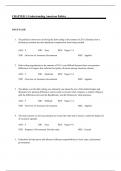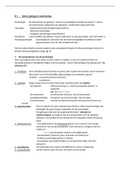EU/INTERNATION LAW PROBLEM 6
Literature:
- Amtenbrink & Vedder, Chapter II, sections 1, 2-2.3 (pp. 29 – 49), section 4.
- Amtenbrink & Vedder, Chapter X, section 2.1 on The Union’s competence to conduct
external policy (p. 552 – 555).
- R. Schütze, An Introduction to European Union Law, Third Edition, Oxford University
Press 2020, Chapter 3, section 3 (71-74) and section 4 (75-82)
Case law:
- Case C-376/98 Tobacco Advertising I (Annulment Procedure, 5 October 2000)
- Case C-300/89 Titanium Dioxide (Annulment Procedure 11 June 1991)
- Case 22-70 ERTA (Annulment Procedure, 31 March 1971)
- Case 11/70 Internationale Handelsgesellschaft (‘Solange I’: Preliminary Ruling 17
December 1970)
- Case 5/88 Wachauf (preliminary Ruling, 13 July 1989)
- Case C-260/89 ERT (Preliminary Ruling 18 June 1991)
- Case C-617/10 Akerberg Fransson (Preliminary Ruling, 26 February 2013)
1. When is the EU competent to act?
When the EU derives its competence from an explicit transfer of competence in the TFEU,
this is an explicit external competence.
The EU has competence to take external action in a given area as soon as it has the
competence to take internal action in that area, this is referred to as the AETR doctrine.
Case 22/70 AETR -> The ICJ was able to establish the existence of an implied external
competence on the grounds that the Union had actually exercised the corresponding internal
competence.
In a later opinion, the ICJ held that the EU has external competence where the competence
in question was necessary for the attainment of one of the objectives.
The implied powers doctrine is thus stretched to the point where internal competence
automatically entails external competence -> in foro interno, in foro externo principle
The flip side is that when external action is not indispensable to attain the Union’s goals, no
competence exists.
The Union’s competence to conclude international agreements is now codified in art. 261(1)
TFEU. This provision includes two categories of competence:
1. The competence ‘where the Treaties so provide’ = explicit competence
2. The implied competence where the provision refers to the conclusion of an agreement
that is necessary in order to achieve, within the framework of the Union’s policies, the
objectives of the Treaties.
, The European legal order defines different competence categories that determine the
distribution of power between the European Union (Union) and its Member States
in various policy fields.
1. Exclusive competences: In areas of exclusive competence, only the Union can
legislate and adopt legally binding acts. Member States can act within these areas
only if empowered by the Union or for implementing Union acts. Specific policy areas
designated as exclusive competences include the customs union, competition rules
for the internal market, monetary policy for eurozone countries, conservation of
marine biological resources, and the common commercial policy. Article 3(2) TFEU
allows for the expansion of exclusive competence in certain situations.
2. Shared competences: Shared competences are the standard competences of the
Union, allowing both the Union and Member States to legislate and adopt legally
binding acts in a specific policy area. Member States can exercise their competence to
the extent that the Union has not already done so. However, Article 2(2) TFEU seems
to demand automatic pre-emption of Member State action, creating some confusion.
3. Coordinating competences: Coordinating competences, found in Article 5 TFEU, are
used to provide arrangements for coordinating economic, employment, and social
policies among Member States. These competences lack a clear definition of their
constitutional character but involve the Union providing guidelines and initiatives for
coordination.
4. Complementary competences: Complementary competences, listed in Article 2(5)
TFEU, involve actions to support, coordinate, or supplement Member States' actions
in various areas, such as health, industry, culture, tourism, education, civil protection,
and administrative cooperation. These competences do not entail harmonization of
Member States' laws or regulations, but the exact meaning of the prohibition of
harmonization remains unclear.
Literature:
- Amtenbrink & Vedder, Chapter II, sections 1, 2-2.3 (pp. 29 – 49), section 4.
- Amtenbrink & Vedder, Chapter X, section 2.1 on The Union’s competence to conduct
external policy (p. 552 – 555).
- R. Schütze, An Introduction to European Union Law, Third Edition, Oxford University
Press 2020, Chapter 3, section 3 (71-74) and section 4 (75-82)
Case law:
- Case C-376/98 Tobacco Advertising I (Annulment Procedure, 5 October 2000)
- Case C-300/89 Titanium Dioxide (Annulment Procedure 11 June 1991)
- Case 22-70 ERTA (Annulment Procedure, 31 March 1971)
- Case 11/70 Internationale Handelsgesellschaft (‘Solange I’: Preliminary Ruling 17
December 1970)
- Case 5/88 Wachauf (preliminary Ruling, 13 July 1989)
- Case C-260/89 ERT (Preliminary Ruling 18 June 1991)
- Case C-617/10 Akerberg Fransson (Preliminary Ruling, 26 February 2013)
1. When is the EU competent to act?
When the EU derives its competence from an explicit transfer of competence in the TFEU,
this is an explicit external competence.
The EU has competence to take external action in a given area as soon as it has the
competence to take internal action in that area, this is referred to as the AETR doctrine.
Case 22/70 AETR -> The ICJ was able to establish the existence of an implied external
competence on the grounds that the Union had actually exercised the corresponding internal
competence.
In a later opinion, the ICJ held that the EU has external competence where the competence
in question was necessary for the attainment of one of the objectives.
The implied powers doctrine is thus stretched to the point where internal competence
automatically entails external competence -> in foro interno, in foro externo principle
The flip side is that when external action is not indispensable to attain the Union’s goals, no
competence exists.
The Union’s competence to conclude international agreements is now codified in art. 261(1)
TFEU. This provision includes two categories of competence:
1. The competence ‘where the Treaties so provide’ = explicit competence
2. The implied competence where the provision refers to the conclusion of an agreement
that is necessary in order to achieve, within the framework of the Union’s policies, the
objectives of the Treaties.
, The European legal order defines different competence categories that determine the
distribution of power between the European Union (Union) and its Member States
in various policy fields.
1. Exclusive competences: In areas of exclusive competence, only the Union can
legislate and adopt legally binding acts. Member States can act within these areas
only if empowered by the Union or for implementing Union acts. Specific policy areas
designated as exclusive competences include the customs union, competition rules
for the internal market, monetary policy for eurozone countries, conservation of
marine biological resources, and the common commercial policy. Article 3(2) TFEU
allows for the expansion of exclusive competence in certain situations.
2. Shared competences: Shared competences are the standard competences of the
Union, allowing both the Union and Member States to legislate and adopt legally
binding acts in a specific policy area. Member States can exercise their competence to
the extent that the Union has not already done so. However, Article 2(2) TFEU seems
to demand automatic pre-emption of Member State action, creating some confusion.
3. Coordinating competences: Coordinating competences, found in Article 5 TFEU, are
used to provide arrangements for coordinating economic, employment, and social
policies among Member States. These competences lack a clear definition of their
constitutional character but involve the Union providing guidelines and initiatives for
coordination.
4. Complementary competences: Complementary competences, listed in Article 2(5)
TFEU, involve actions to support, coordinate, or supplement Member States' actions
in various areas, such as health, industry, culture, tourism, education, civil protection,
and administrative cooperation. These competences do not entail harmonization of
Member States' laws or regulations, but the exact meaning of the prohibition of
harmonization remains unclear.





